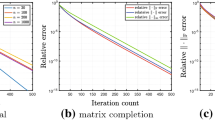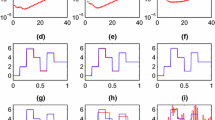Abstract
The paper studies the progressive decoupling algorithm (PDA) of Rockafellar and focuses on the elicited version of the algorithm. Based on a generalized Yosida-regularization of S**arn’s partial inverse of an elicitable operator, it is shown that the elicited progressive decoupling algorithm (EPDA), in a particular nonmonotone setting, linearly converges at a rate that could be viewed as the rate of a rescaled PDA, which may provide certain guidance to the selection of the parameters in computational practice. A preliminary numerical experiment shows that the choice of the elicitation constant has an impact on the efficiency of the EPDA. It is also observed that the influence of the elicitation constant is generally weaker than the proximal constant in the algorithm.
Similar content being viewed by others
References
Eckstein, J., Bertsekas, D.P.: On the Douglas-Rachford splitting method and the proximal point algorithm for maximal monotone operators. Math. Program. 55(3), 293–318 (1992)
Lu, Y., Sun, J., Zhang, M., Zhang, Y.: A stochastic variational inequality approach to the Nash equilibrium model of a manufacturer-supplier game under uncertainty. preprint. Department of Analytics and Operations National University of Singapore (2020)
Minty, G.J.: Monotone (nonlinear) operators in Hilbert space. Duke Math. J. 29(3), 341–346 (1962)
Pennanen, T.: Local convergence of the proximal point algorithm and multiplier methods without monotonicity. Math. Oper. Res. 27(1), 170–191 (2002)
Qi, L., Sun, J.: A nonsmooth version of Newton’s method. Math. Program. 58, 353–367 (1993)
S**arn, J. E.: Partial inverse of a monotone operator. Appl. Math. Optim. 10(3), 247–265 (1983)
Rockafellar, R. T.: Monotone operators and the proximal point algorithm. SIAM J. Control Optim. 14(5), 877–898 (1976)
Rockafellar, R.T.: Progressive decoupling of linkages in monotone variational inequalities and convex optimization. In: Proceedings of the 10th International Conference on Nonlinear Analysis and Convex Analysis (Chitose, Japan), pp 1–21 (2017)
Rockafellar, R.T.: Progressive decoupling of linkages in optimization and variational inequalities with elicitable convexity or monotonicity. Set-Valued Var. Anal. 27, 863–893 (2019)
Rockafellar, R.T., Sun, J.: Solving monotone stochastic variational inequalities and complementarity problems by progressive hedging. Math. Program. 174, 453–471 (2019)
Rockafellar, R.T., Sun, J.: Solving Lagrangian variational inequalities with applications to stochastic programming. Math. Program. 181, 435–451 (2020)
Rockafellar, R.T., Wets, R.-J.B.: Scenarios and policy aggregation in optimization under uncertainty. Math. Oper. Res. 16(1), 119–147 (1991)
Rockafellar, R.T., Wets, R.-J.B.: Stochastic variational inequalities: single-stage to multistage. Math. Program. 165(1), 331–360 (2017)
Zhang, M., Hou, L.S., Sun, J., Yan, A.L.: A model of multistage risk-averse stochastic optimization and its solution by scenario-based decomposition algorithms. Asia-Pacific J. Oper. Res. 37(4), 2040004 (2020). https://doi.org/10.1142/S0217595920400047
Zhang, M., Sun, J., Xu, H.: Two-stage quadratic games under uncertainty and their solution by progressive hedging algorithms. SIAM J. Optim. 29 (3), 1799–1818 (2019)
Funding
This work is partially supported by Chinese Academy of Sciences (Grant 292021000088) and National Science Foundation of China (Grant 12101598).
Author information
Authors and Affiliations
Corresponding author
Additional information
Publisher’s Note
Springer Nature remains neutral with regard to jurisdictional claims in published maps and institutional affiliations.
Rights and permissions
About this article
Cite this article
Sun, J., Zhang, M. The Elicited Progressive Decoupling Algorithm: A Note on the Rate of Convergence and a Preliminary Numerical Experiment on the Choice of Parameters. Set-Valued Var. Anal 29, 997–1018 (2021). https://doi.org/10.1007/s11228-021-00613-0
Received:
Accepted:
Published:
Issue Date:
DOI: https://doi.org/10.1007/s11228-021-00613-0




